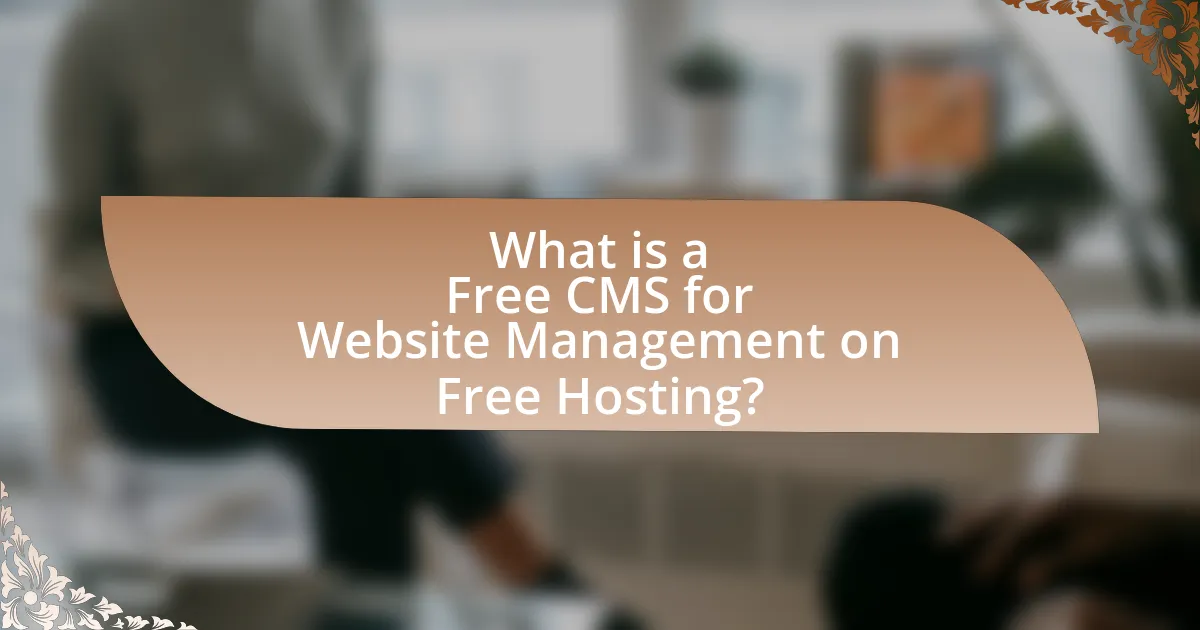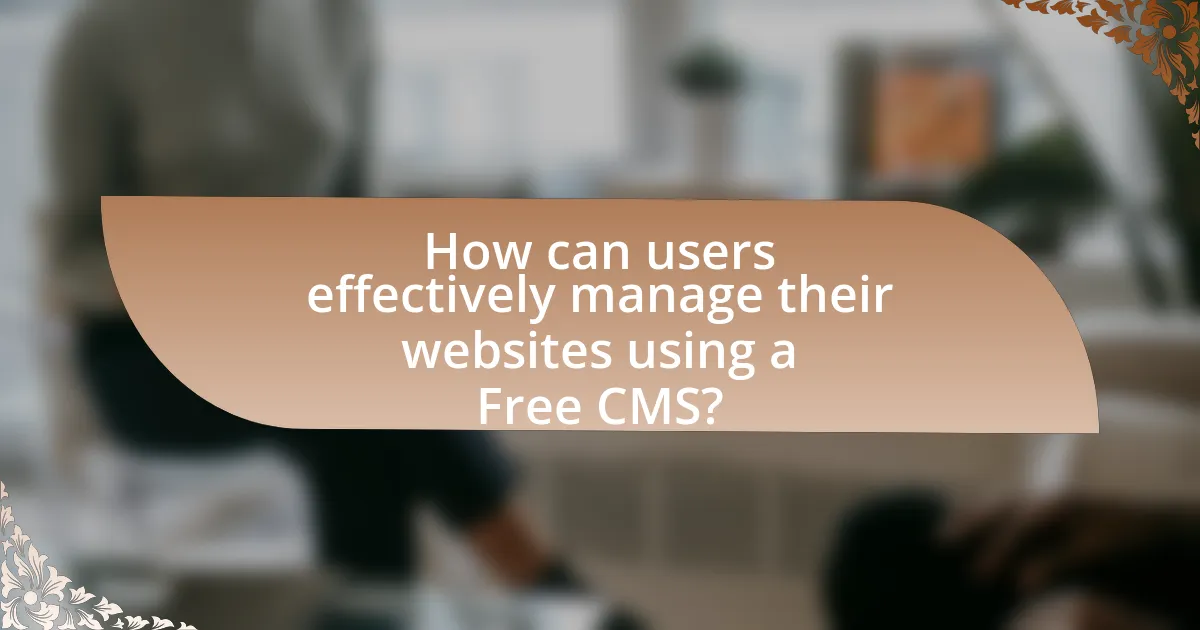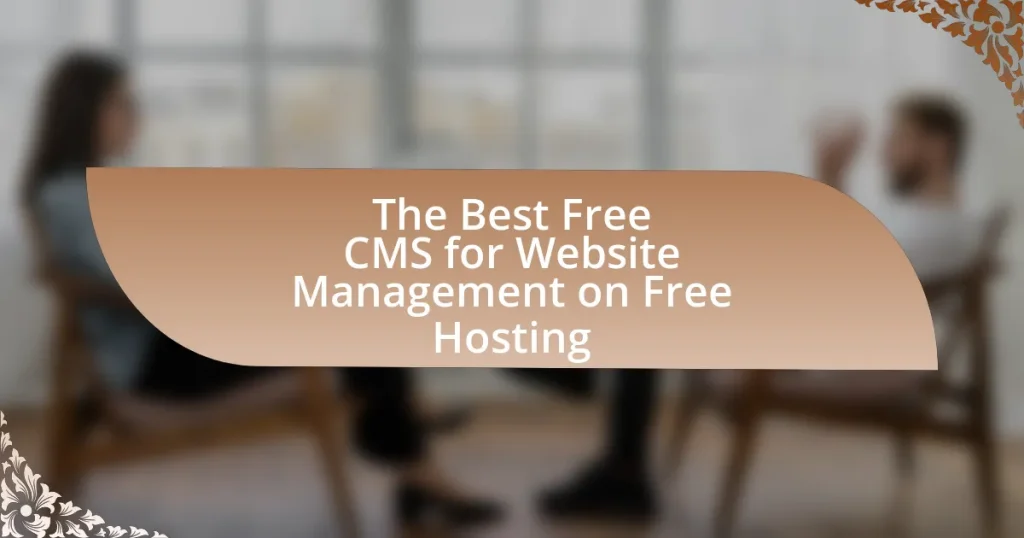The article focuses on the best free content management systems (CMS) for website management on free hosting platforms, highlighting options such as WordPress, Joomla, and Drupal. It explains how these systems function, their key features, and the advantages they offer, including cost-effectiveness and user-friendliness. The article also addresses the integration of free CMS with hosting services, best practices for website management, and common challenges users may face. Additionally, it provides insights into optimizing website performance and security measures necessary for effective management on free hosting.

What is a Free CMS for Website Management on Free Hosting?
A free CMS for website management on free hosting is a content management system that allows users to create, manage, and modify website content without requiring extensive technical knowledge, all while being hosted at no cost. Examples of such free CMS platforms include WordPress, Joomla, and Drupal, which provide user-friendly interfaces and a variety of templates and plugins to enhance website functionality. These platforms are widely recognized for their ease of use and flexibility, making them suitable for individuals and small businesses looking to establish an online presence without incurring hosting fees.
How does a Free CMS function in website management?
A Free Content Management System (CMS) functions in website management by providing users with tools to create, edit, and organize digital content without requiring extensive technical knowledge. These systems typically feature user-friendly interfaces, allowing individuals to manage website elements such as text, images, and multimedia easily. For example, platforms like WordPress and Joomla offer templates and plugins that enhance functionality and design, enabling users to customize their sites according to specific needs. The effectiveness of free CMS options is evidenced by their widespread adoption; as of 2023, WordPress powers over 40% of all websites globally, demonstrating the reliability and capability of free CMS solutions in managing diverse online content.
What are the key features of a Free CMS?
A Free CMS typically includes features such as user-friendly interfaces, customizable templates, and plugin support. User-friendly interfaces allow individuals with minimal technical skills to create and manage content easily. Customizable templates enable users to design their websites according to their preferences without extensive coding knowledge. Plugin support enhances functionality by allowing users to add features like SEO tools, social media integration, and e-commerce capabilities. These features collectively empower users to build and maintain websites effectively, making Free CMS platforms popular choices for website management on free hosting services.
How does a Free CMS integrate with free hosting services?
A Free CMS integrates with free hosting services by utilizing compatible software that allows users to install and manage their websites without incurring costs. These systems often provide one-click installation options for popular CMS platforms like WordPress or Joomla directly through the hosting provider’s control panel. This seamless integration is facilitated by the hosting service’s support for PHP and MySQL, which are essential for running most free CMS applications. Additionally, many free hosting services offer pre-configured environments tailored for specific CMS platforms, ensuring that users can easily set up their websites with minimal technical knowledge.
What are the advantages of using a Free CMS on Free Hosting?
Using a Free CMS on Free Hosting offers cost-effectiveness and accessibility for users. This combination allows individuals and small businesses to create and manage websites without incurring expenses associated with paid services. Free CMS platforms, such as WordPress and Joomla, provide user-friendly interfaces and a variety of templates, enabling users to design websites easily. Additionally, free hosting services often come with essential features like basic storage and bandwidth, making it feasible for users to launch their sites quickly. According to a 2021 survey by W3Techs, over 40% of websites utilize WordPress, highlighting the popularity and reliability of free CMS options.
How does cost-effectiveness play a role in website management?
Cost-effectiveness is crucial in website management as it directly influences budget allocation and resource optimization. Effective website management requires balancing quality and expenses, ensuring that the chosen content management system (CMS) provides essential features without incurring high costs. For instance, utilizing a free CMS can significantly reduce operational expenses while still offering robust functionalities, such as user-friendly interfaces and customizable templates. According to a study by the Content Marketing Institute, businesses that leverage cost-effective solutions can allocate saved resources towards marketing and user engagement, ultimately enhancing website performance and reach.
What flexibility does a Free CMS offer for users?
A Free CMS offers users significant flexibility in website management by allowing customization, scalability, and ease of use without financial constraints. Users can modify themes, plugins, and functionalities to suit their specific needs, enabling a tailored user experience. Additionally, many Free CMS platforms support various content types and layouts, facilitating diverse website designs. The open-source nature of many Free CMS options allows for community contributions, which enhances features and security over time. This adaptability is evidenced by platforms like WordPress, which powers over 40% of websites globally, showcasing its extensive customization capabilities and user-friendly interface.

Which Free CMS options are the best for website management?
The best free CMS options for website management are WordPress, Joomla, and Drupal. WordPress powers over 40% of all websites globally, making it the most popular choice due to its user-friendly interface and extensive plugin ecosystem. Joomla offers flexibility and is suitable for complex websites, while Drupal is known for its robust security features and scalability, making it ideal for larger, more complex sites. Each of these CMS platforms provides a strong foundation for website management, supported by large communities and extensive documentation.
What criteria should be considered when choosing a Free CMS?
When choosing a Free CMS, consider factors such as ease of use, customization options, community support, security features, and scalability. Ease of use ensures that users can navigate and manage content without extensive technical knowledge, which is crucial for non-developers. Customization options allow for flexibility in design and functionality, enabling users to tailor the CMS to their specific needs. Community support is vital as it provides access to resources, forums, and plugins, enhancing the CMS’s capabilities. Security features protect the website from vulnerabilities, which is essential for maintaining user trust and data integrity. Scalability ensures that the CMS can grow with the website, accommodating increased traffic and content without performance issues. These criteria collectively contribute to a robust and effective website management experience on free hosting platforms.
How important is user-friendliness in a Free CMS?
User-friendliness is crucial in a Free CMS because it directly impacts user engagement and satisfaction. A user-friendly interface allows individuals with varying technical skills to navigate and utilize the CMS effectively, which is essential for managing websites without extensive coding knowledge. Research indicates that 70% of users prefer platforms that are easy to use, leading to higher retention rates and increased content creation. Therefore, a Free CMS that prioritizes user-friendliness can significantly enhance the overall experience and effectiveness of website management.
What role does community support play in selecting a Free CMS?
Community support is crucial in selecting a Free CMS as it provides users with access to resources, troubleshooting assistance, and shared experiences. A strong community often leads to a wealth of tutorials, plugins, and themes, enhancing the CMS’s functionality and usability. For instance, platforms like WordPress benefit from a large community that contributes to extensive documentation and forums, making it easier for users to resolve issues and optimize their websites. This collaborative environment fosters innovation and ensures that the CMS remains updated and secure, as community members actively contribute to its development and maintenance.
What are the top Free CMS platforms available today?
The top free CMS platforms available today are WordPress, Joomla, and Drupal. WordPress powers over 40% of all websites globally, making it the most popular CMS due to its user-friendly interface and extensive plugin ecosystem. Joomla offers flexibility and is suitable for complex websites, while Drupal is known for its robust security features and scalability, making it ideal for larger, more complex sites. These platforms are widely recognized for their capabilities in website management and are supported by large communities, ensuring ongoing development and support.
How does WordPress compare to other Free CMS options?
WordPress is the most popular free CMS, powering over 40% of all websites, which sets it apart from other free CMS options like Joomla and Drupal. Its user-friendly interface, extensive plugin ecosystem, and large community support contribute to its dominance, making it easier for users to create and manage websites without extensive technical knowledge. In contrast, Joomla offers more flexibility for complex sites but has a steeper learning curve, while Drupal is highly customizable but typically requires more technical expertise. These factors highlight WordPress’s accessibility and versatility compared to its competitors in the free CMS landscape.
What unique features does Joomla offer as a Free CMS?
Joomla offers several unique features as a free content management system (CMS), including a robust user management system, extensive multilingual support, and a flexible framework for building complex websites. The user management system allows for the creation of different user groups with varying access levels, facilitating collaboration and content control. Joomla’s multilingual capabilities enable users to create websites in multiple languages without the need for additional plugins, making it ideal for global audiences. Additionally, its framework supports the development of custom extensions and templates, allowing for tailored website functionality and design. These features collectively enhance Joomla’s versatility and usability as a free CMS.

How can users effectively manage their websites using a Free CMS?
Users can effectively manage their websites using a Free CMS by leveraging its user-friendly interface, customizable templates, and built-in tools for content creation and SEO optimization. Free CMS platforms like WordPress, Joomla, and Drupal provide intuitive dashboards that simplify website management tasks such as adding pages, editing content, and managing media files. Additionally, these systems often include plugins and extensions that enhance functionality, allowing users to optimize their sites for search engines and improve user experience. According to a 2021 survey by W3Techs, WordPress powers over 40% of all websites, demonstrating its effectiveness and popularity among users for website management.
What are the best practices for website management with a Free CMS?
The best practices for website management with a Free CMS include regular updates, effective content organization, and robust security measures. Regular updates ensure that the CMS and its plugins are current, reducing vulnerabilities; for instance, outdated software can be exploited, leading to data breaches. Effective content organization involves using categories and tags to enhance navigation and improve user experience, which can lead to higher engagement rates. Robust security measures, such as implementing strong passwords and using security plugins, protect the website from potential threats, as statistics show that 43% of cyber attacks target small businesses. Following these practices helps maintain a functional, secure, and user-friendly website.
How can users optimize their website’s performance on free hosting?
Users can optimize their website’s performance on free hosting by minimizing file sizes and utilizing efficient coding practices. Reducing image sizes through compression tools can significantly decrease load times, as studies show that images often account for over 60% of a webpage’s total weight. Additionally, employing clean and streamlined HTML, CSS, and JavaScript can enhance loading speed, as excessive code can slow down performance. Utilizing caching techniques, such as browser caching, can also improve user experience by storing frequently accessed data. Furthermore, selecting a lightweight content management system (CMS) can lead to better performance, as some CMS options are specifically designed to operate efficiently on limited resources.
What security measures should be taken when using a Free CMS?
When using a Free CMS, essential security measures include regularly updating the CMS and its plugins, implementing strong passwords, and utilizing security plugins. Regular updates are crucial because they patch vulnerabilities; for instance, a study by Sucuri found that 90% of hacked websites were running outdated software. Strong passwords prevent unauthorized access, as weak passwords are easily compromised; the National Institute of Standards and Technology recommends using complex passwords. Security plugins, such as Wordfence or Sucuri Security, provide additional layers of protection by monitoring for threats and blocking malicious activity. These measures collectively enhance the security posture of a Free CMS, safeguarding against common vulnerabilities.
What common challenges do users face with Free CMS on Free Hosting?
Users commonly face limitations in performance and functionality when using Free CMS on Free Hosting. These challenges include restricted server resources, which can lead to slow loading times and downtime, affecting user experience and site reliability. Additionally, users often encounter limited storage and bandwidth, restricting the amount of content they can host and the number of visitors they can accommodate. Security vulnerabilities are also prevalent, as free hosting services may not provide adequate protection against cyber threats, leaving websites exposed. Furthermore, users may struggle with a lack of technical support, making it difficult to resolve issues promptly. These challenges are well-documented, with studies indicating that free hosting services often compromise on quality and security compared to paid options.
How can users troubleshoot issues related to website downtime?
Users can troubleshoot issues related to website downtime by first checking their internet connection to ensure it is stable and operational. If the connection is fine, users should then verify if the website is down for everyone or just them by using online tools like Down For Everyone Or Just Me. Next, users should clear their browser cache and cookies, as outdated data can cause loading issues. Additionally, checking the website’s hosting service status can reveal if there are server-side problems. If the website is built on a CMS, users should look for any recent updates or changes that might have caused the downtime. Finally, contacting the hosting provider’s support can provide insights into the issue and potential resolutions.
What are the limitations of using a Free CMS on Free Hosting?
Using a Free CMS on Free Hosting presents several limitations, including restricted storage and bandwidth, lack of technical support, and limited customization options. Free hosting services often impose strict limits on the amount of data and traffic a website can handle, which can hinder performance and scalability. Additionally, users typically do not receive dedicated customer support, making it challenging to resolve issues promptly. Furthermore, free CMS platforms may restrict access to advanced features and plugins, limiting the ability to tailor the website to specific needs. These constraints can significantly impact the overall functionality and user experience of the website.
What tips can enhance the experience of using a Free CMS on Free Hosting?
To enhance the experience of using a Free CMS on Free Hosting, users should prioritize selecting a lightweight CMS that minimizes resource usage, ensuring faster loading times and better performance. Lightweight CMS options, such as WordPress or Joomla, are designed to operate efficiently even on limited hosting resources, which is crucial for free hosting environments that often impose restrictions on bandwidth and storage. Additionally, users should regularly update their CMS and plugins to maintain security and functionality, as outdated software can lead to vulnerabilities and performance issues. Utilizing caching plugins can also significantly improve site speed by storing static versions of pages, reducing server load. Finally, optimizing images and other media files before uploading can further enhance loading times, making the overall user experience smoother and more enjoyable.
How can users leverage plugins and themes for better functionality?
Users can leverage plugins and themes to enhance functionality by selecting specific tools that address their website needs. Plugins extend the capabilities of a content management system (CMS) by adding features such as SEO optimization, social media integration, and e-commerce support, while themes provide customizable designs that improve user experience and engagement. For instance, a study by W3Techs shows that over 40% of websites use WordPress, which offers thousands of plugins and themes, allowing users to tailor their sites effectively. This adaptability leads to improved performance, user satisfaction, and ultimately, better website management on free hosting platforms.
What resources are available for learning more about Free CMS management?
Online resources for learning about Free CMS management include official documentation from popular CMS platforms such as WordPress, Joomla, and Drupal, which provide comprehensive guides and tutorials. Additionally, websites like W3Schools and Codecademy offer free courses on CMS usage and management. Forums and community sites like Stack Overflow and Reddit also serve as valuable platforms for peer support and knowledge sharing. These resources are widely recognized for their reliability and depth of information, making them effective for anyone looking to enhance their understanding of Free CMS management.










